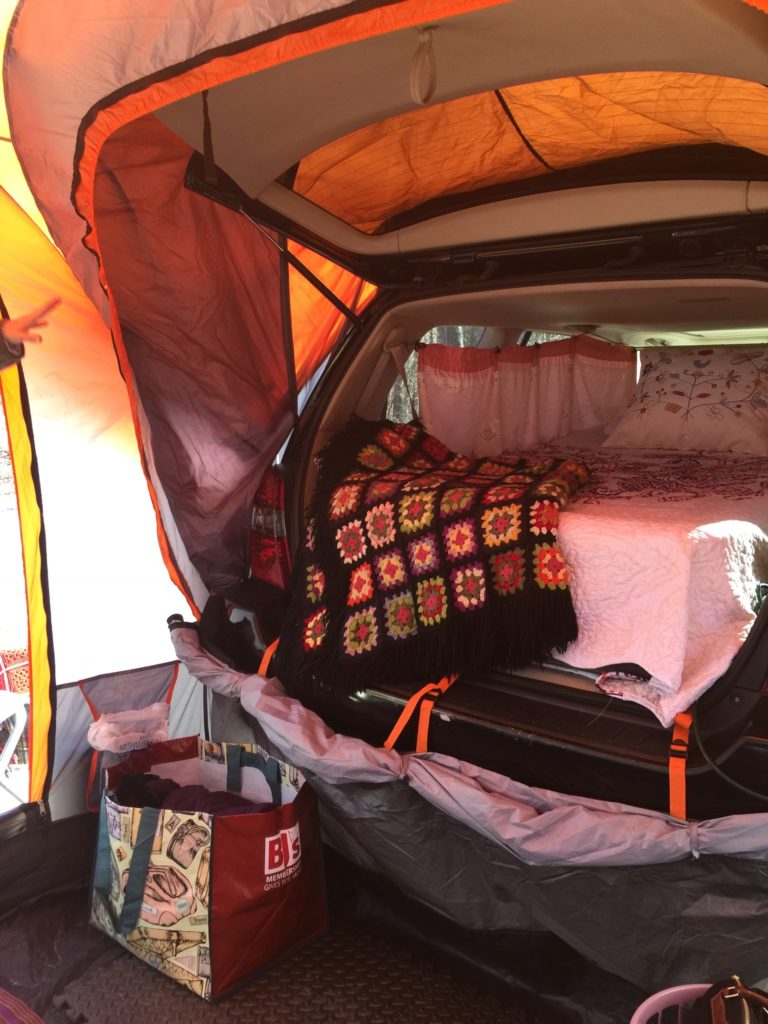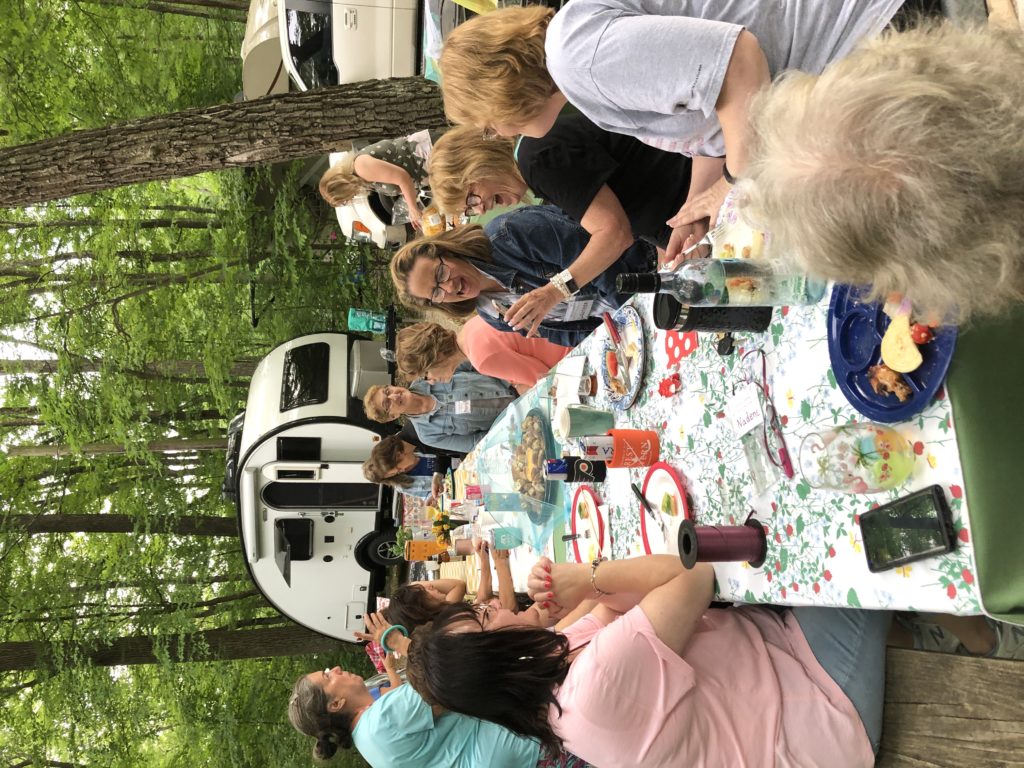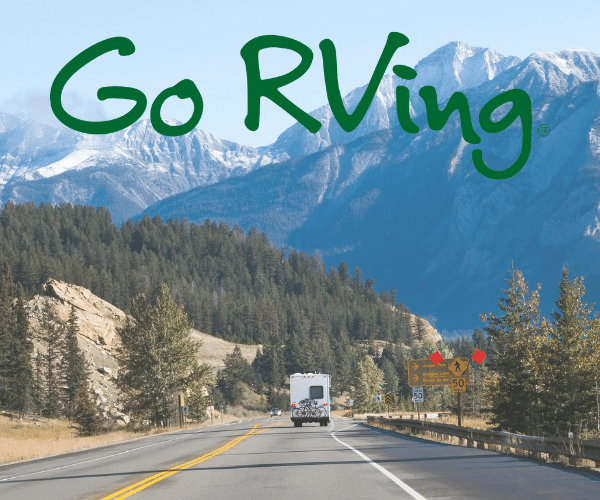Podcast: Play in new window | Download (Duration: 37:58 — 21.7MB)
On this week’s podcast I am answering listeners questions! I think it is so important to remember that for many, this camping thing is all brand new and we definitely want to be the site that says, “There’s no such thing as a dumb question” so, here we go!
Submitted by: Michelle Cole
Travel Trailer vs motor home with toad behind – Which would have better gas mileage?
Answer: This is so much a matter of personal preferences. In 2018 I did a podcast episode on the many different types of RV’s out there. In the list below you can listen to the pros and cons of all the different RV’s and see what resonates most with you. I will say that my preference was a travel trailer because I didn’t want to take down camp each time I left the campsite. I also like “coming home” to my RV after a day of sightseeing. I gave up the perk of having a bathroom, kitchen and bed with me everywhere I go, but the trade off of being more mobile in my tow vehicle rather than a larger motor home, was worth it to me.
https://girlcamper.com/blog/2018/02/06/episode-117-re-imagining-the-toy-hauler/
https://girlcamper.com/blog/2018/06/05/exploring-the-class-b-motor-home/
https://girlcamper.com/blog/2018/08/21/the-pros-and-cons-of-teardrop-trailers/
https://girlcamper.com/blog/2018/03/06/episode-121-class-c-motorhome-pros-and-cons/
https://girlcamper.com/blog/2018/11/06/episode-147-the-pros-and-cons-of-class-a-motorhomes/
Submitted by: Beth Jordan
Is it okay to turn your propane fridge on the day before you leave so its cold in the morning?
Answer: It’s not only ok, it’s highly recommended. RV refrigerators work best when they are prechilled and you put cold food in them. I did a mini podcast episode about this a few months ago. Here are a few of the tips to get you started but you can see all the tips for RV refrigerators in the blog post below!
• Plug it in the night before so it is cold when you put food in it.
• Make sure the food you put in it is already cold.
• Use an RV refrigerator air circulator to keep cold air moving around. Camco makes several different kinds.
• Set it on Auto and then it will run on electricity as soon as you plug it in. When you disconnect the electric it will go to propane automatically.
• For the quick retrieval of foods organize the lunch foods or snacks in plastic, open weave baskets or bins that you can pull out with everything you need in one place.
https://girlcamper.com/blog/2018/05/30/rv-refrigerator-tips/
Submitted by: Debra Allen
I am using my Ford Transit Connect to car camp. What kind of extension cord or converter can I use to run my refrigerator, DVD or pressure cooker?
Answer: Car Camping is a great option for many reasons. When you arrive you are really already set up. No tent to find level ground for. If it is raining you are bound to be drier in the car. You are off the ground. You can make camp before you leave home by setting up your bed and curtains ahead of time. One of the women I regularly car camp with has an extension cord in which the wire is flat as opposed to round. When she shuts the tail gate it doesn’t crush the cord. It also rotates once plugged in so that it does not block the other available outlet.
https://www.amazon.com/dp/B0721TV97N/ref=cm_sw_r_em_api_i_c_a9LiDbD3A0AYS

Submitted by: Sandy Newkirk
How often do you clean the fresh water tank and how do you do it?
Answer: That is all going to depend on how often you use it. If you are a full timer, as Sandy is, twice a year will do the trick. You are changing out the water daily and not giving it much of a chance to sit and grow bacteria. If however you only use your RV every few weeks, chances are high that bacteria can grow in the tank. It’s easy to clean your RV water tank with regular household bleach.
1) Close all drains and make sure drain plugs are installed
2) Add ¼ cup of household bleach for every 15 gallons of water the tank holds
3) Mix the desired amount of bleach in a one gallon container with water and using a funnel, pour it into the fresh water tank.
4) Fill the fresh tank completely full
5) Turn on the pump and open all the valves, sink, shower, outdoor shower and toilet until you smell bleach.
6) Close all of the faucets and let the water and bleach sit for at least 12 hours
7) Drain all of the water and refill the tank with potable water.
8) Turn all the faucets on and run the water until you no longer smell bleach. You may have to completely empty and refill the tank to achieve this. You are now ready to go!
Submitted by: Sheila Esson
Why do SUV’s with 5K tow capacity and a tow package come with 4 pin connectors and no trailer brakes? Buyer has to do these mods to tow?
Answer: If I had to venture a guess Sheila, it would be cost. Only a small percentage of people buying an SUV with towing ability of 5K or under will actually use it to tow something. It’s not in their best financial interest to install them. Consumers are not demanding it. You see them on all big trucks as a standard feature because the statistics show that it’s likely to be used for a boat, RV, flat bed trailer, utility truck or the like. That’s why people buy them. I’m just grateful that the wiring is there for the 4 prong because there are several different brands of adapters that will turn a 4 prong into a 7 way with very little effort or expense. If you decide to have a trailer brake controller put in, please have a professional do it.
Submitted by: Gail Crawford
Favorite campground? Franchise, state park, National Park, or private?
Answer: I think I am kind of a PollyAnna, ‘glass is half full’ person anyway, so I’m usually pretty happy wherever I am. What I like is being with friends. Having the opportunity to camp with people I care about as well as those new to camping is my jam. It’s always a thrill to mentor someone new and watch their excitement and be able to be part of their learning process. Secondly, I really love being unplugged. It takes me a day or two to get over the constant checking of the phone for updates, emails, alerts. I’m a pretty big digital junkie when I am at home. When I get to the campground and nothing works, by default, I read, I sew, I knit, I visit, I walk, I do nothing!! I put myself in time out! Lastly, for me, there’s no substitute for a campfire or babbling brook. When I was at Camp Taylor Campground a few weeks ago I had a Creekside sight where I fell asleep to the sound of the water tumbling over the rocks all night. I had my window wide open and a great breeze coming in. It was heaven. If a campground can offer any of those things I don’t care if it’s a state, national, private or themed campground!!

Submitted by: Jeanne Gaffney
My propane detector keeps going off. I’ve replaced it and it keeps happening although I have had all the lines checked and everything seems fine.
Answer: This is a really common problem that you don’t want to solve by disconnecting the detector.
First, turn off your tanks and make sure there isn’t a leak. If the tanks are off and the alarm is still ringing, you know that there’s no possible way propane could leaking and causing the signal to go off.
If it is a battery operated device, as is the case in most older trailers, change the batteries to fresh ones. Always start with the easy answer.
If it is hard wired to the trailer as most new trailers are, get a vacuum and vacuum the grill covering the detector to get any dust out of it that might be activating it.
Be aware the they are sensitive and any chemicals that got in your air can set it off. Hair spray, bug spray, cleaning products can set it off. Open all the windows and see if it goes off.
Check your fuses. Sometimes if there is a power surge of some kind it can affect the fuse. Replacing the fuse can sometime reset it and keep it from endlessly chirping. You should always carry a box of multi size fuses in your RV.
If you do all of that and it is still beeping, turn the propane tanks off and remove the fuse so that it will stop sounding off and then take it in to the dealer.
Submitted by: Mary Kirlin
For those that live in warmer climates and don’t winterize their trailers, what do we have to check in the spring?
Answer: If you do not winterize your trailer because you live in an area that is not prone to freezing you should still empty all of your tanks. At the end of the season, open all the valves and let all of the water run out of everything in your RV that holds water. The toilet, fresh water tank, grey water tank, black water tank, hot water heater and don’t forget the outdoor shower that could have water in the hose. Leave all of the valves open.
In the spring, close them all and fill the tanks with fresh water on a dry day. Turn on the water pump and run the faucets. Check beneath the trailer to see if anything is leaking. Chances are you are good if you had dry tanks to begin with.
Follow the system we talked about earlier for sanitizing your tanks and listen to our podcast with Mark Polk where he talked about Spring Projects for your RV. You will want to check your battery for good health, window seals, vents for cracks and of course y our tires before you hit the road.
https://girlcamper.com/blog/2019/04/09/episode-163-spring-rv-projects-with-mark-polk/
Well, that Part One of our Ask Girl Camper a Question. Next week I will finish the list. There were so many questions and such a variety of questions which was so enlightening to me. It’s a good reminder that we are all in different stages of this journey and I always want to honor that and make sure that we aren’t leaving anyone out here!!
Camco Black Streak Remover is our featured product this week! I just used this to get all the streaks off my trailer!
Camco 41008 Black Streak Remover 32 Oz, 32. Fluid_Ounces https://www.amazon.com/dp/B00T9IR9N0/ref=cm_sw_r_cp_api_i_UZMiDbTFZZDVG







